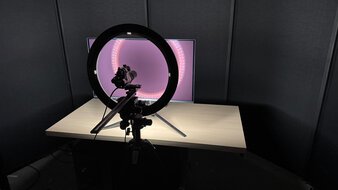
Getting a monitor that delivers optimal HDR picture quality and performance is beneficial for playing the latest games. There are a few factors that make a monitor great for HDR, which we take into account during our extensive testing that includes nearly 400 tests. A high contrast ratio helps the monitor display deep blacks against bright objects. The display can make those highlights pop against the rest of the image when combined with high brightness and an effective local dimming feature. You'll also want something that displays a wide range of vivid colors in HDR so that images are life-like and realistic.
Although most monitors are still behind TVs in terms of overall image quality and processing in HDR, there are monitors with OLED panels or Mini LED backlighting that provide fantastic performance. Even some budget-friendly monitors are good for HDR, but cheap monitors usually have limited HDR picture quality. Another advantage of getting a monitor instead of a TV for HDR gaming is that they have higher refresh rates, leading to a smoother feel. A monitor with a fast response time also makes motion look sharp, and low input lag results in a responsive feel, although most monitors have low input lag.
We've bought and tested more than 360 monitors, and below, you'll find our recommendations for the best HDR gaming monitors. Also, see our recommendations for the best OLED monitors, the best HDR monitors, and the best Mini LED monitors.
Quick Look




Best HDR Gaming Monitor
 HDR Picture9.4PC Gaming9.1Console Gaming9.4HDR Color Volume8.8HDR Color Gamut9.6HDR Brightness6.8Contrast10Black Uniformity10Size27"Pixel TypeQD-OLEDMax Refresh Rate240 HzSee all our test resultsNative Resolution3840 x 2160
HDR Picture9.4PC Gaming9.1Console Gaming9.4HDR Color Volume8.8HDR Color Gamut9.6HDR Brightness6.8Contrast10Black Uniformity10Size27"Pixel TypeQD-OLEDMax Refresh Rate240 HzSee all our test resultsNative Resolution3840 x 2160The best HDR gaming monitor that we've tested is the ASUS ROG Swift OLED PG27UCDM. It offers both high-end gaming performance and premium picture quality. It's a 27-inch, 4k monitor that's fantastic for gaming because of its near-instantaneous response time, which results in crystal-clear motion in games with no distracting blur trail. Its 240Hz refresh rate benefits most gamers, and it has HDMI and DisplayPort 2.1 bandwidth to take full advantage of both gaming consoles and modern graphics cards.
On top of that, HDR content looks amazing because its QD-OLED panel has a near-infinite contrast ratio, and highlights really pop. It displays perfect blacks in dark rooms, but they look purple in bright rooms as ambient light causes the black levels to rise. Luckily, it even displays an incredibly wide color gamut with remarkable color volume, so your favorite games look stunningly vivid and life-like, and the high resolution makes content appear full of detail. It even supports Dolby Vision and has different modes available in HDR, giving it more customization than other monitors. You can also check out the similar ASUS ROG Swift OLED PG32UCDM if you want a bigger option with a 32-inch screen, but it doesn't support DisplayPort 2.1 bandwidth like the PG27UCDM.
Best Upper Mid-Range HDR Gaming Monitor
 HDR Picture9.5PC Gaming9.2Console Gaming9.1HDR Color Volume8.9HDR Color Gamut9.6HDR Brightness6.8Contrast10Black Uniformity10Size27"Pixel TypeQD-OLEDMax Refresh Rate360 HzSee all our test resultsNative Resolution2560 x 1440
HDR Picture9.5PC Gaming9.2Console Gaming9.1HDR Color Volume8.9HDR Color Gamut9.6HDR Brightness6.8Contrast10Black Uniformity10Size27"Pixel TypeQD-OLEDMax Refresh Rate360 HzSee all our test resultsNative Resolution2560 x 1440If you don't need a high-end 4k monitor like the ASUS ROG Swift OLED PG27UCDM, check out the lower-end ASUS ROG Strix OLED XG27ACDNG. It has a QD-OLED panel like the higher-end PG27UCDM, so the picture quality is nearly the same in HDR with deep blacks in dark rooms and vivid colors, but there are a few trade-offs for getting the cheaper model. It has a lower resolution than the PG27UCDM, so images aren't as detailed. It doesn't support Dolby Vision, either, and lacks DisplayPort 2.1 bandwidth.
Besides that, it's still fantastic for gaming as it has a near-instantaneous response time, so fast-moving objects are sharp, and it even has a higher 360Hz refresh rate, ideal for competitive gaming. It also has HDMI 2.1 bandwidth to take advantage of modern graphics cards and gaming consoles. This includes supporting any signal from consoles like downscaled 4k @ 120Hz, which is useful because the Xbox Series X|S only supports HDR with 4k signals. However, like the PG27UCDM, blacks look purple in bright rooms, but this is a drawback of getting a QD-OLED, and you'd have to consider a different panel if you want better blacks in bright rooms.
Best Mid-Range HDR Gaming Monitor
 HDR Picture9.0PC Gaming9.0Console Gaming8.3HDR Color Volume8.0HDR Color Gamut9.0HDR Brightness7.3Contrast10Black Uniformity10Size27"Pixel TypeOLEDMax Refresh Rate240 HzSee all our test resultsNative Resolution2560 x 1440
HDR Picture9.0PC Gaming9.0Console Gaming8.3HDR Color Volume8.0HDR Color Gamut9.0HDR Brightness7.3Contrast10Black Uniformity10Size27"Pixel TypeOLEDMax Refresh Rate240 HzSee all our test resultsNative Resolution2560 x 1440If you don't need high-end QD-OLEDs like the ASUS ROG Strix OLED XG27ACDNG, you can still find the best HDR monitor for gaming in the mid-range price category with the ASUS ROG Strix OLED XG27AQDMG. It's an OLED monitor, but unlike the higher-end monitors, it has a WOLED panel and not QD-OLED, so colors aren't as vivid. That said, it still offers incredible picture quality in HDR with deep blacks in dark rooms, and it also gets bright enough to make small highlights pop. Plus, blacks don't look purple in bright rooms like on the XG27ACDNG, but you still need to use it in a dark room to get perfect black levels.
Aside from those small differences, it provides everything you'd expect from a gaming monitor, like a near-instantaneous response time and support for all common VRR formats. It has a lower 240Hz refresh rate than the XG27ACDNG, but it's still high enough for most gamers. Unfortunately, it doesn't support HDMI 2.1 bandwidth, so it can't take full advantage of HDMI 2.1 sources like gaming consoles. If that's important to you, the LG 27GS95QE-B is a similar monitor that supports HDMI 2.1 bandwidth, but it doesn't get as bright as the ASUS.
Best Budget HDR Gaming Monitor
 HDR Picture8.0PC Gaming8.2Console Gaming7.4HDR Color Volume8.3HDR Color Gamut8.3HDR Brightness8.7Contrast8.8Black Uniformity7.3Size27"Pixel TypeVAMax Refresh Rate180 HzSee all our test resultsNative Resolution2560 x 1440
HDR Picture8.0PC Gaming8.2Console Gaming7.4HDR Color Volume8.3HDR Color Gamut8.3HDR Brightness8.7Contrast8.8Black Uniformity7.3Size27"Pixel TypeVAMax Refresh Rate180 HzSee all our test resultsNative Resolution2560 x 1440There aren't as many monitors with good HDR performance in the budget category, but some are still ahead of the competition, like the AOC Q27G3XMN. It's a step down from the ASUS ROG Strix OLED XG27AQDMG because it doesn't have an OLED panel, so it doesn't display the same deep and inky blacks without any blooming. Instead, it uses Mini LED backlighting with a good local dimming feature that helps it improve its picture quality in dark scenes with deep blacks next to bright highlights, but there's just a bit more blooming compared to an OLED. On the plus side, it gets very bright in HDR, more than the ASUS, so highlights really pop. You can also check the similar AOC Q27G40XMN if you want something with a better local dimming feature and even brighter screen, but it has some bugs in HDR.
Although the Q27G3XMN doesn't have a 240Hz refresh rate like the ASUS, its 180Hz refresh rate is still good enough for most gamers. And while its response time isn't near-instantaneous either, it's still fast, but there's some smearing with fast-moving objects. Unfortunately, it doesn't have HDMI 2.1 bandwidth to take full advantage of gaming consoles either, but that's what you have to expect for a budget monitor.
Notable Mentions
- Dell Alienware AW2725Q:
The Dell Alienware AW2725Q is a 4k, 240Hz QD-OLED that's cheaper than the ASUS ROG Swift OLED PG27UCDM. It's a good choice if you're on a tighter budget, and it also supports Dolby Vision, but it doesn't get as bright as the ASUS.
See our review - Sony INZONE M10S:
The Sony INZONE M10S is an upper mid-range gaming monitor that's an alternative to the ASUS ROG Strix OLED XG27ACDNG if you want a higher refresh rate. It's fantastic for gaming, but because it has a WOLED panel and not QD-OLED, colors aren't as vivid.
See our review - Gigabyte AORUS FO27Q3:
The Gigabyte AORUS FO27Q3 is a 1440p, 360Hz QD-OLED that competes with the ASUS ROG Strix OLED XG27ACDNG. While you can't go wrong with either monitor, and you should get whichever you can find for cheaper in your region, the Gigabyte can be harder to find at times.
See our review - Acer Nitro XV275K P3biipruzx:
The Acer Nitro XV275K P3biipruzx is a mid-range 4k monitor that gets brighter than the ASUS ROG Strix OLED XG27AQDMG thanks to its Mini LED backlighting. This makes it a good alternative if you prefer a Mini LED monitor over an OLED. However, it has worse HDR picture quality, a lower refresh rate, and doesn't have the same near-instantaneous response time as the ASUS.
See our review
Recent Updates
Jul 09, 2025:
We removed the MSI MPG 321URX QD-OLED as it's hard to find, and renamed the ASUS ROG Swift OLED PG27UCDM to the 'Best Monitor.' We also replaced the MSI MPG 271QRX QD-OLED with the ASUS ROG Strix OLED XG27ACDNG for consistency with other recommendations, as the MSI is hard to find. Lastly, in the Notable Mentions, we replaced the Dell Alienware AW3225QF, LG 32GS95UE-B, and the Xiaomi G Pro 27i with the Dell Alienware AW2725Q and the Sony INZONE M10S.
Apr 15, 2025:
We added the ASUS ROG Swift OLED PG27UCDM as the 'Best 27-Inch Monitor' to give another option. We also removed the Acer Nitro XV275U P3biipx because it's hard to find. Lastly, we replaced the Samsung Odyssey OLED G80SD S32DG80 and the ASUS ROG Strix OLED XG27ACDNG with the Xiaomi G Pro 27i and the Gigabyte AORUS FO27Q3 in the Notable Mentions.
Feb 19, 2025:
In the Notable Mentions, we replaced the Gigabyte AORUS FO27Q3 with the ASUS ROG Strix OLED XG27ACDNG. We also introduced a new format to the article and updated the text to reflect these changes.
Dec 16, 2024:
We replaced the Samsung Odyssey OLED G8/G80SD S32DG80 with the ASUS ROG Swift OLED PG32UCDM because the ASUS supports Dolby Vision. We also replaced the Gigabyte AORUS FO27Q3 with the MSI MPG 271QRX QD-OLED for consistency with other recommendations. We moved the Acer Nitro XV275K P3biipruzx to the Notable Mentions, as it increased in price, and added the Acer Nitro XV275U P3biipx as the 'Best Cheap.' We also removed the Dell Alienware AW2725DF and the Samsung Odyssey Neo G7 S32BG75 from the Notable Mentions based on changes in the recommendation.
Oct 03, 2024: We made several changes to ensure consistency with other recommendations. We replaced the Dell Alienware AW3225QF, Dell Alienware AW2725DF, LG 27GS95QE-B, and the Acer Nitro XV275U P3biipx with the Samsung Odyssey OLED G8/G80SD S32DG80, Gigabyte AORUS FO27Q3, ASUS ROG Strix OLED XG27AQDMG, and the AOC Q27G3XMN, respectively. In Notable Mentions, we replaced the Samsung Odyssey Neo G8 S32BG85 with the Samsung Odyssey Neo G7 S32BG75 and added the AW3225QF and the AW2725DF.
All Reviews
Our recommendations are based on what we think are the best HDR monitors for gaming currently available. They are adapted to be valid for most people in each price range. Rating is based on our review, factoring in price, and feedback from our visitors.
If you would prefer to make your own decision, here is the list of all of our HDR monitor reviews. Be careful not to get too caught up in the details. Most monitors are good enough to please most people, and the things we fault monitors on are often not noticeable unless you really look for them.
Comments
Best HDR Gaming Monitors: Main Discussion
What do you think of our picks? Let us know below.
Looking for a personalized buying recommendation from the RTINGS.com experts? Insiders have direct access to buying advice on our insider forum.
We’ve just released a new video that mentions the Acer Nitro XV275K P3biipruzx, AOC Q27G3XMN, ASUS ROG Strix OLED XG27ACDNG, and ASUS ROG Swift OLED PG27UCDM here.






































































